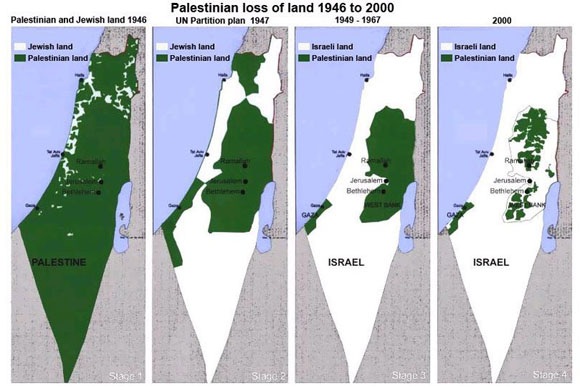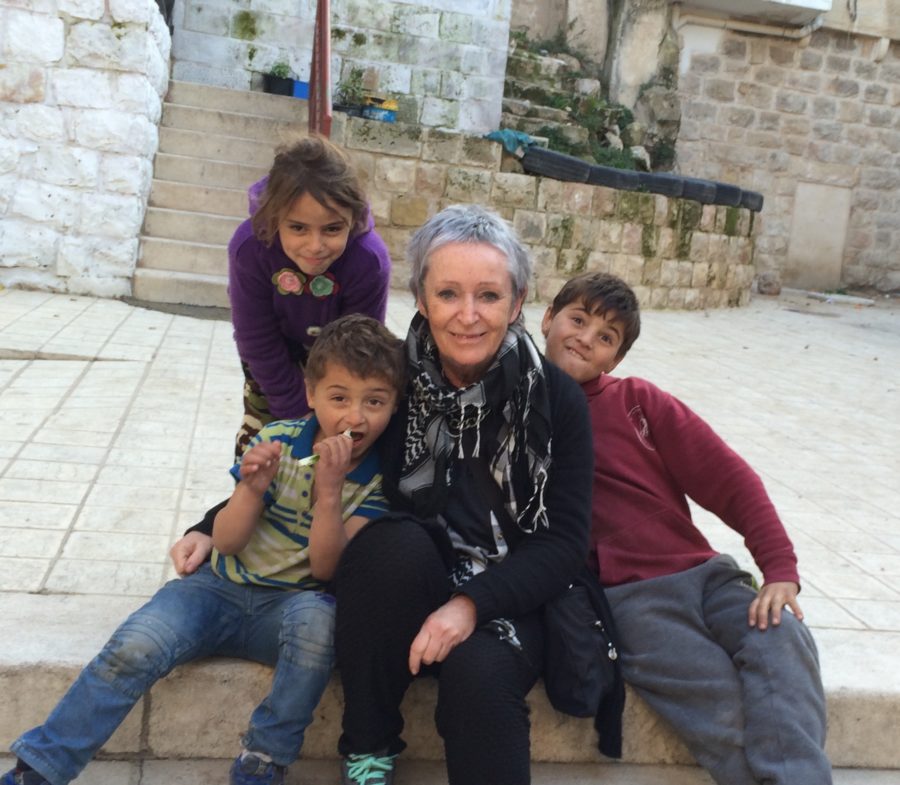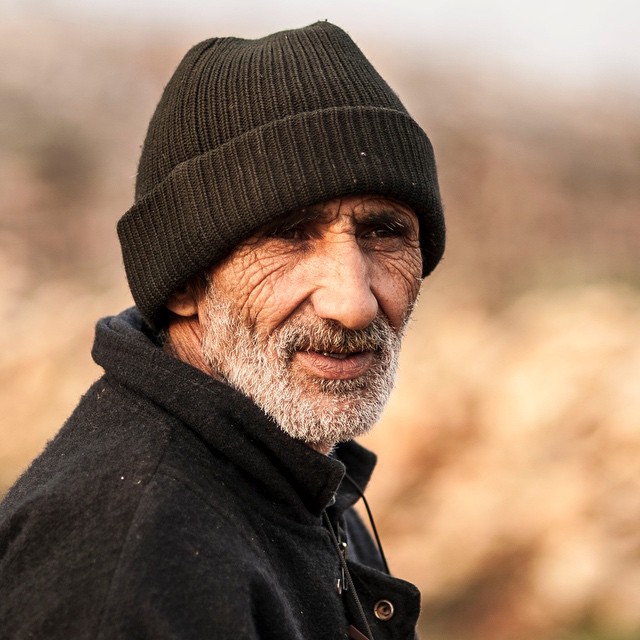On a crisp, sunny morning in Hebron in January of this year my friend Atta Jaber tells me: ‘The settlers have what they wanted and Randina sits on a chair.’
Atta resembles a Kerry farmer, one in particular comes to mind: the late Sam Brown from Maharees in West Kerry. He is sinewy, with a mahogany-coloured face, and a mischievous twinkle in dark Arabic eyes, revealing a profound gentleness of soul.
Atta is also a farmer, whose family land of fifty-eight dunums (one acre is the equivalent of four dunam) spans both sides of Route 60, outside Hebron in the West Bank. This land is his vocation and passion, and the overwhelming source of the family’s food.
His wife Randina used to work on the land from 5am every morning. He confides: ‘Randina has green fingers and made everything grow!’
Today, Atta’s farm house has only four metres of land surrounding it and some eight dunums at the bottom of a steep hill. The white plastic chairs outside the back door are still there for chat, tea and cigarettes in the sun. But the soul of the Jabers has been uprooted. Randina sits on a chair now for long periods of time. The state of Israel has confiscated forty-eight of the fifty-six dunums of which they own the title deeds.
I first met Atta in early January, 2010, while volunteering with EAPPI in Hebron. We received a call from him saying settlers had arrived in three large buses, and were on his land with picks and shovels, guns slung over their shoulders.
As ever with settler incursions and attacks, they were accompanied by heavily armed Israeli military personnel. In randomly banging their picks and shovels into the ground, they were making a statement: Atta’s land was now their land. One teenage settler shouted out to say I was a Nazi.
Later, while discussing what happened, Atta rhetorically asked: ‘Why did Randina marry me? What kind of a life does she have here with me?’
The family home had been occupied by either settlers or the Israeli army on three separate occasions by 2010. During one period, the family was permitted to remain in a part of their home, while the military occupied the rest.
In the intervening years the settlers continued to display a sense of entitlement over the land, which they claim Abraham gave to the Jewish people. Year after year they ripped out the Jaber family’s irrigation pipes; then they trampled on the crops.
Atta and Randina would repair and re-plant, again and again and again. The land was the source of their food after all.
In the last two years three members of Jaber’s family have seen their homes on the land bulldozed and demolished. One of Atta’s brothers now rents an apartment in Hebron city. His food and income has disappeared.
Forty-eight of the original fifty-six dunams have been seized by the state of Israel. Parts of the remaining Jaber land can only be accessed with an Israeli permit. The last time they worked that part they required a permit for access. They went ahead and planted the ground, and continued to water it, but were then denied a permit when it came to the harvest. The produce was seized by settlers, which could have easily found its way onto an Irish dinner plate.
The remaining eight dunams accessible to the Jabers lies at the bottom of a hill. Randina has developed asthma and is unable to walk the route. That illness also means she cannot be prescribed other medication to ease a damaged soul. Randina sits silently and for long periods now, and as Atta says goodbye he adds: ‘I stand beside her.’
As I am leaving, Atta then tells me he is returning home to tend to his newly planted cauliflower crop on the remaining eight dunums. I said I hoped they would become really, really big cauliflowers. What more could I say? I wish I could help him get his land back, but only the combined will of the governments of the world have the power to bring that about.
Atta and Randina have a deep and enduring love for one another, but the land sustaining their bodies and souls has been brutally seized by the state of Israel.
This is the human impact of illegal settlements on the Palestinian West Bank, and not an isolated case. Since the U.N. Declaration in 1949 establishing the state of Israel, dividing Palestine in half, Palestinians were left with 22% of their former land.[i] That proportion of historic Palestine was allocated by the U.N. to other Arab states, Jordan and Egypt – the areas of Gaza and the West Bank. These lands, and more, were conquered by Israel during the Six-Day-War of 1967, but were not incorporated into Israel proper.

Under the Oslo Accords of 1993, Palestinian land was further divided into Areas A, B and C. A part of the West Bank, known as Area C, is now under full Israeli military and civil control. This comprises 60% of the original 22% of land allocated to the indigenous population. Area B is under Palestinian administrative control, but Israeli military occupation.
Accordingly, advocating for a ‘Two-State Solution’ is now empty rhetoric. The land is being taken, inch-by-inch, and the governments of the world do nothing to prevent Israel’s ongoing violation of international law and human rights.
Yet according to the Geneva Convention an occupying state cannot move its citizens into the land it occupies. [ii] There are now over six-hundred thousand Israeli citizens living on the Palestinian West Bank.[iii] Indeed, Israeli Prime Minister Benjamin Netanyahu plans to annex settlements in the West Bank into the state of Israel.[iv]
An effective non-violent response is urgently needed.
The Seanad and Dáil recently passed the Control of Economic Activity (Occupied Territories) Bill 2018.[v] Despite a resounding 75 to 45 majority, with all Opposition Parties voting in favour, Fine Gael voted against this Bill and it is understood they will use the controversial ‘Money Message’ procedure to block it.
This procedure has been employed in recent times to block a number of Private Member’s Bills. It is clearly undemocratic and potentially unconstitutional.
Its use also exposes tacit support for Israel’s breach of International Law and human rights. This is consistent with the Irish State’s failure to exchange diplomatic accreditation with the State of Palestine, despite the Dáil and Seanad voting unanimously for recognition in 2014.
Yet this failure of democracy in Ireland pales in comparison with the tyrannical treatment meted out to Atta Jaber and his family.
Do you think this piece is valuable? If so, you might consider providing us with financial support via Patreon, or simply pay us a small sum directly using PayPal: [email protected]. Thanks for supporting independent journalism. Subscribe for free to our monthly newsletter here.

Gerry delivers Certified Professional Mediation Training that is accredited by the Mediators’ Institute of Ireland. She has delivered conflict and mediation training internationally with U.S. based Lawyers Without Borders, in partnership with the Director of Training from CEDR, U.K., and she is also an externally employed trainer with CEDR U.K. Gerry is a member of the Mediators Beyond Borders Consultants Team. She is a panel member with One Resolve and delivers mediation training under their auspices. Gerry was involved in the development of the Level 8 Certificate in Mediation training programme in the Law Faculty of Griffith College and she was invited to be the senior lecturer in that programme. She also delivered mediation training for the University of Limerick’s, “Masters in Peace and Development” programme. Gerry has written ‘The Mediator’s Toolkit: Formulating and Asking Questions for Successful Outcomes’, and it is published by New Society Publishing, Canada.
[i] See: United Nations Office for the Coordination of Humanitarian Affairs (OCHA), https://www.ochaopt.org/sites/default/files/the_west_bank_including_east_jerusalem_and_the_gaza_strip_jan_2019.pdf
[ii] GENEVA CONVENTION (IV) RELATIVE TO THE PROTECTION OF CIVILIAN PERSONS IN TIME OF WAR (GENEVA CONVENTION IV) Article 49, https://ihl-databases.icrc.org/ihl/COM/380-600056?OpenDocument or
https://www.un.org/ruleoflaw/files/Geneva%20Convention%20IV.pdf
[iii] ‘Btselem’, ‘Statistics on Settlements and Settler Population’, The Israeli Information Center for Human Rights in the Occupied Territories, Updated January 19th, 2019, https://www.btselem.org/settlements/statistics
[iv] Oliver Holmes, ‘Netanyahu vows to annex Jewish settlements in occupied West Bank’, April 19th, 2019, The Guardian, https://www.theguardian.com/world/2019/apr/07/netanyahu-vows-to-annexe-jewish-settlements-in-occupied-west-bank,
[v] https://www.oireachtas.ie/en/bills/bill/2018/6/




